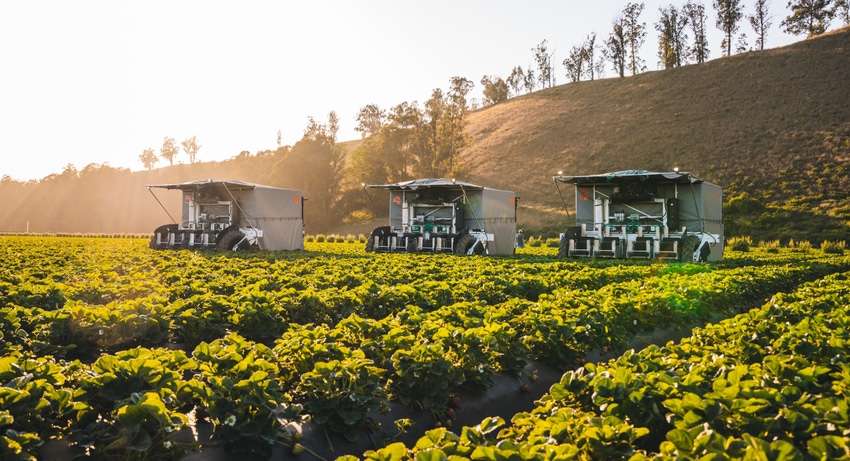
After weeks of consideration, Western Growers and its allies have placed their bets on 13 companies they hope will lead a march to automating at least half the West Coast's specialty crop harvests by 2030.
The companies will be the first in a cohort of startups and established businesses that will receive technical aid as part of Western Growers' ambitious Global Harvest Automation Initiative.
The organization and its partners will also present these companies to growers so they’re not inundated with scores of company pitches and can focus on a handful that are right for their operations.
The chosen businesses all specialize in agricultural robotics, mechanization and automation, according to Western Growers. In addition to taking part in field trials and case studies, they will receive systems integration in a "technology stack" that's being prepared as part of the initative.
“Most harvest startups build the entire technology stack themselves — from imaging and artificial intelligence to robotic end-effectors and automated movement up and down the fields," said Walt Duflock, the organization's vice president of innovation..He added the initiative "will now build this technology stack for them.
Related: Western Growers to lead global push to automate fruit harvests
“The innovators in this cohort are both startups and established companies that will get help integrating with industry-standard tractors, robot arms and sensors, which can commoditize up to 60–80% of the startup’s technology stack," he said.
The organization is "making real progress on getting the industry to increase their collective collaboration effort" led by trade groups including the Washington Tree Fruit Research Commission on things like grower economics by crop type for harvest, Duflock told Farm Progress in an email.
The 13 companies
According to Western Growers, the following companies were chosen:
Advanced Farm Technologies: provides advanced farming tools, such as automated strawberry harvesting robots, for harvesting services
Antobot: builds a team of small intelligent agriculture robots with advanced computer vision and robotics technology
Augean Robotics: helps solve the labor problem facing farmers by making autonomous collaborative robots
Earth Rover: makes field robots that automate scouting, harvesting and weeding, and provides farmers with per-plant data from seed to gate
FarmWise: designs driverless tractors that use machine learning and computer vision, rather than herbicides, to eradicate weeds from farmers' fields
FFRobotics: develops a reliable, robust harvesting platform emulating human-hand picking process for efficient, cost-effective and bruise-free fruit harvesting
Muddy Machines: builds a new generation of field robots that help growers manage labor-intensive crops by conducting fieldwork
Oxbo International Corporation: designs, manufactures and distributes innovative harvesting equipment and related products
Ramsay Highlander: original equipment manufacturer and custom manufacturer of design-built harvesting aids, mechanical harvesting machines and specialized harvesting machines for the vegetable growing industry
Ripe Robotics: builds and manages fruit-picking robots
Robotics Plus: enables sustainable growth of the horticultural and fiber industries through robotics and automation
SPUDNIK Equipment Company LLC: manufactures potato harvesting and handling equipment
Strio AI: automates labor-intensive tasks for specialty growers, starting with runner cutting for strawberries
The organization also announced a team of mentors with expertise in precision ag, robotics, artificial intelligence, equipment manufacturing, harvest automation and grower/shipper operations, who will advise the cohort companies.
Weeding and harvest
The Davis, Calif.-based Advanced Farm’s robotic strawberry harvester uses soft grippers and tractor-mounted cameras that are able to determine the ripeness of berries and safely harvest them without damaging the fruit. Right now, Advanced Farm’s robotic strawberry harvester is only used in California, where 90 percent of U.S. strawberries are produced.
Kyle Cobb, co-founder and chief financial officer of Advanced Farm, said earlier this year there is strong demand for a robotic strawberry harvester because regulatory challenges, the minimum wage and overtime laws continue to put a great deal of cost pressure on growers.
“What is always true about agriculture is it is really tough work with really tough jobs that frankly need to be automated,” he said in a virtual forum.
Related: Robotic weed removal eliminates need for expensive hand crews
Salinas, Calif.-based FarmWise is a service company with a robotic weeding machine capable of rouging weeds at speeds of one-to-two miles per hour. This eliminates the need for expensive hand crews or chemical herbicides.
Company Chief Executive Officer Sebastien Boyer said last winter his long-term goal is to find additional ways to mechanize the manual labor and tedious tasks performed by human hands. Through the machine learning the AI can distinguish cauliflower, celery, broccoli, and cabbage. Other crops including tomatoes and pepper are being perfected.
Dozens of partners
The Irvine, Calif.-based Western Growers is teaming with dozens of international partners for the automation initiative, which was rolled out in an all-day forum at the International Agri-Center in Tulare, Calif., in February.
The groups have an ally in three West Coast land-grant universities -- Washington State, Oregon State and the University of California, Davis -- which are seeking ways to use robotics in the harvests of apples, pears and other tree fruit in a parallel project called Fruit Orchard of the Future.
Related: Robotics playing bigger role
The Washington Tree Fruit Research Commission is involved in both initiatives, committing $200,000 to Western Growers over three years after signing on to the universities’ effort the week before.
Ines Hanrahan, the commission’s executive director, told the Tulare gathering that 13 billion apples must be picked in Washington each year but the industry lacks the equipment to pick it without using manual labor.
Western Growers’ mission “will provide scientific solutions to keep farms profitable and sustainable,” Hanrahan said. “I believe this is a mission we can all agree on. I am convinced that together we can get there.”
Resources and detailed information about the harvest initiative can be found on the WG Center for Innovation & Technology webpage here.
About the Author(s)
You May Also Like






